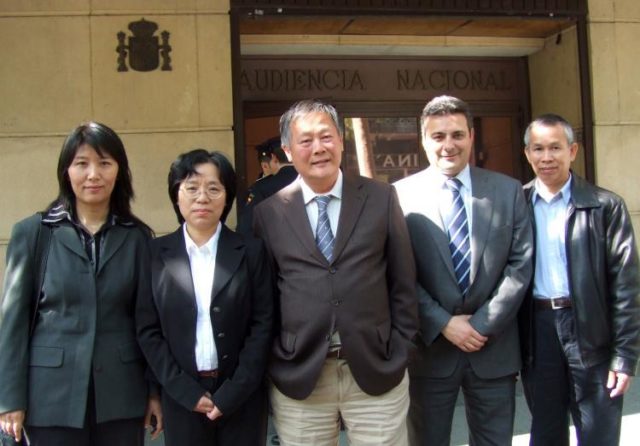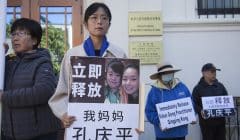International Legal Developments: Landmark Indictments of Top CCP Officials for Torture, Crimes Against Humanity, Genocide

HRLF Attorney Carlos Iglesias (second from right) and democracy activist Wei Jingsheng (center) stand with Falun Gong victims of persecution Lu Shiping, Dai Ying (left), and Li Jianhui (right), after testifying before Judge Moreno as part of his investigation into torture and genocide committed against Falun Gong. May 2, 2009. (Victor Liu/The Epoch Times)
By the end of 2009, over 70 civil and criminal complaints had been filed against Chinese officials in 30-plus national courts on six continents on behalf of Falun Gong victims of persecution in China. Leading the effort has been a small but dedicated group of attorneys at the Human Rights Law Foundation, a non-profit organization headquartered in Washington, D.C.
Despite the Chinese Communist Party’s (CCP) geopolitical influence and determined efforts to make the cases go away, several lawsuits have resulted in judgments in favor of Falun Gong victims. These include Doe v. Gua Chuanjie, a 2005 case in which the judge issued a default judgment against the defendant; Doe v. Liu Qi and Doe v. Xia Deren, 2002 cases before the Federal District Court for the Northern District of California, where the judge declared that the defendants had violated the plaintiffs’ rights to be free from torture, arbitrary detention, and cruel, inhuman, or degrading treatment; and Peng Liang v. Zhao Zhefei, a 2001 case before the Federal District Court for the Southern District of New York, where the judge issued a default judgment against the defendant.
Towards the end of 2009, two new rulings joined this list as judges in Spain and Argentina issued landmark judicial decisions in response to lawsuits charging top CCP officials with international crimes.
After undertaking thorough investigations—which included reviewing third party reports and hearing testimony from Falun Gong victims—the judges in Spain and Argentina concluded that the widespread human rights violations committed against Falun Gong practitioners amount to crimes against humanity and even genocide. They issued indictments, and in Argentina, an international order of capture, rendering the prospect of CCP officials being brought to justice for their crimes more real than ever before.
The following are summary accounts of the Spanish and Argentine cases and their potential implications based on information provided by HRLF staff. For more detailed information, please visit the HRLF website: http://www.hrlf.net/.
November 2009: Spanish Court Indicts Top Communist Party Officials for Torture, Genocide of Falun Gong
Court Decision: In an unprecedented decision, on November 2, 2009, a Spanish judge indicted five high-ranking CCP officials for their role in crimes of torture and genocide committed against Falun Gong practitioners.
Following a two-year investigation, Judge D. Ismael Moreno in the Central Court for Preliminary Criminal Proceedings, Number 2, of the National Spanish Court notified HRLF Europe Director, Attorney Carlos Iglesias—who filed and litigated the case—that the court had granted the petition to indict the defendants.
Judge Moreno did so after finding that “the facts alleged in the complaint have the character of crimes of genocide and torture.” The decision was made under the legal principle of universal jurisdiction, which allows domestic courts to hear cases of genocide and crimes against humanity regardless of where they occur.
Defendants and Evidence: Among the accused are former CCP leader Jiang Zemin, widely acknowledged as the primary instigator of the campaign launched in 1999 to “eradicate” Falun Gong. Also facing charges is Luo Gan, who oversaw the 6-10 Office, an extra-legal, nationwide CCP security taskforce that has led the violent campaign. Chinese lawyers have compared the 6-10 Office to Nazi Germany’s Gestapo in its brutality and extra-legal activities.
The other three accused are Bo Xilai, current Party Secretary for Chongqing and former Minister of Commerce; Jia Qinglin, the fourth-highest member of the Party hierarchy; and Wu Guanzheng, head of an internal Party disciplinary committee. The charges against them are based on their proactive advancement of the persecution against Falun Gong when they served as top Party officials in Liaoning, Beijing, and Shandong, respectively. In a Pulitzer prize-winning article, The Wall Street Journal’s Ian Johnson describes how Wu imposed fines on his subordinates if they did not sufficiently crackdown on Falun Gong, leading officials to torture local residents, in some cases, to death.
Other evidence considered by the judge during his investigation included written testimony from fifteen Falun Gong practitioners and oral testimony from seven practitioners, including torture victims and relatives of individuals who had been killed in CCP custody. In reaching his decision, the judge also relied on reports by Amnesty International, Human Rights Watch, and the U.N. Human Rights Commission, as well as evidence submitted by HRLF staff.
Implications and Current Status: In addition to indicting the defendants, the judge also authorized that rogatory letters (letters of request) be sent to each of the five defendants in China, asking them to answer questions relating to their involvement in the persecution of Falun Gong. The judge in the case is currently awaiting responses to the rogatory letters that he issued to the Chinese defendants.
Meanwhile, Attorney Iglesias has begun working with INTERPOL to issue an international detention order. According to HRLF attorneys, if any of the defendants sets foot in a country with which Spain has an extradition treaty, INTERPOL must detain and transport the defendant to Spain to stand trial for the atrocities committed. If the defendants are brought before the Spanish courts, they face possible criminal punishments of up to 20 years imprisonment, though the punishment may be increased in accordance with the number of victims and any additional crimes for which they are convicted. The defendants may also be civilly liable to the victims for damages and their assets may be frozen.
December 2009: Argentine Judge Orders Arrest of Top Chinese Communist Party Officials for Crimes Against Humanity
Court decision: In a landmark decision on December 17, 2009, an Argentine judge indicted and ordered the local INTERPOL department to seek the arrest of two high-ranking CCP officials for their role in crimes against humanity committed against Falun Gong practitioners.
The Falun Dafa Research Association in Argentina filed the case in 2005. Following a four-year long investigation, Argentine judge Octavio Araoz de Lamadrid of Federal Court No. 9 issued a 146-page decision and related orders. The document offers a detailed and damning assessment of the CCP’s persecution of Falun Gong practitioners in China and the role that two top officials played. Judge Lamadrid wrote:
The genocidal strategy … comprised a broad range of actions arranged in total contempt for life and human dignity. The designated purpose – the eradication of Falun Gong – was used to justify any means used. Therefore, torment, torture, disappearances, deaths, brainwashing, psychological torture were everyday occurrences in the persecution of its practitioners.
The judge exercised jurisdiction over the case based on the legal principle of universal jurisdiction, which allows domestic courts to hear cases of genocide and crimes against humanity regardless of where they occur. Lamadrid wrote:
I understand that in the present case the principle of universal jurisdiction must be applied in view of the [severity of the] crimes, the number of victims affected, and the ideological nature of the actions taken against members of the Falun Gong religious group.
Defendants and Evidence: The two defendants in the Argentina case are former CCP head Jiang Zemin and Luo Gan, a former Politburo member who oversaw the 6-10 Office.
According to the attorneys who initially filed the case on behalf of Falun Gong victims, Dr. Alejandro Cowes and Dr. Adolfo Casabal Elia, the judge’s decision was based on evidence that included the oral testimony of 17 victims of torture and other forms of persecution. The judge also took into account the testimony of two medical doctors, United Nations reports, and research by human rights groups, such as Amnesty International, Human Rights Watch, and Human Rights Law Foundation.
Implications and Current Status: Lamadrid has issued several decisions addressing important issues of jurisdiction and the status of crimes against humanity in international and domestic Argentine law. In a 2006 decision, Lamadrid found that there was universal jurisdiction over crimes against humanity committed extraterritorially. He found that the violations of human rights committed against Falun Gong should be judged pursuant to the domestic law of Argentina (which incorporates international law). Moreover, he found that the state of Argentina had a duty not only to respect, but also to guarantee human rights, and that it would be complicit in the crimes in question if it were to fail to use due diligence in preventing, investigating, and punishing them.
On the grounds that the state has a duty to prosecute violators of crimes against humanity, Lamadrid rejected the Justice Department’s recommendation to dismiss the case, instead referring it to the Supreme Court.
The Supreme Court returned the case back to Lamadrid, allowing him to initiate a thorough investigation. The investigation concluded with the issuing of an indictment and an international order with INTERPOL to capture Jiang Zemin and Luo Gan.
Based on this order, should the accused former officials travel to other countries that have extradition treaties with Argentina, they would ostensibly face being detained and transferred to Argentina to be brought before a court for trial. However, following reported CCP pressure on the Argentine authorities, the case was subsequently transferred to another judge who dismissed it. The dismissal decision is currently on appeal.






